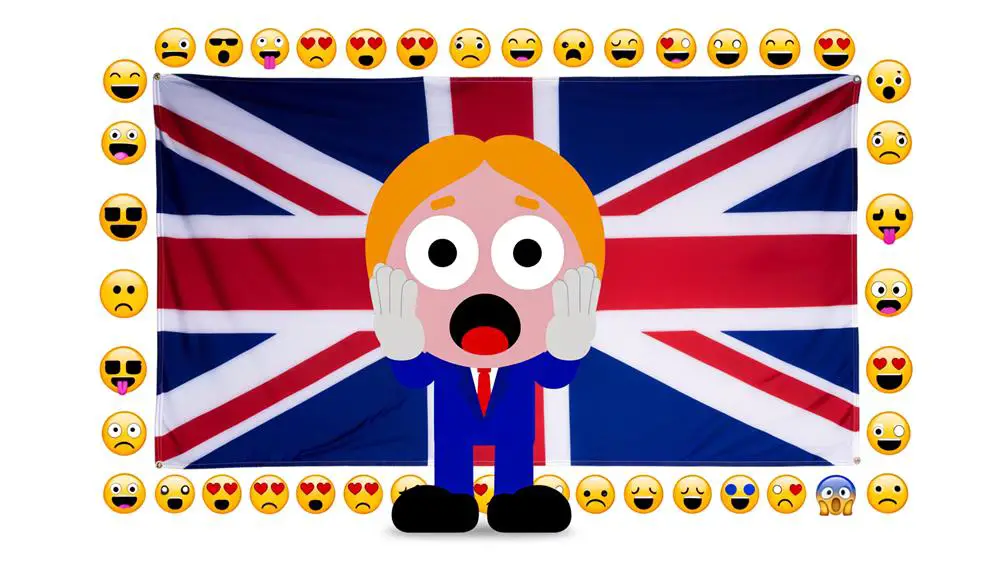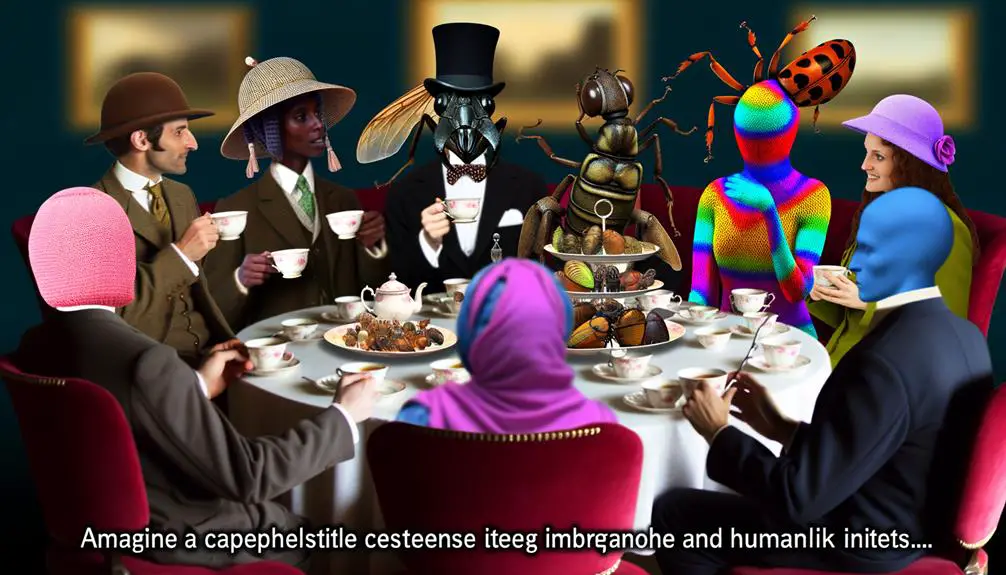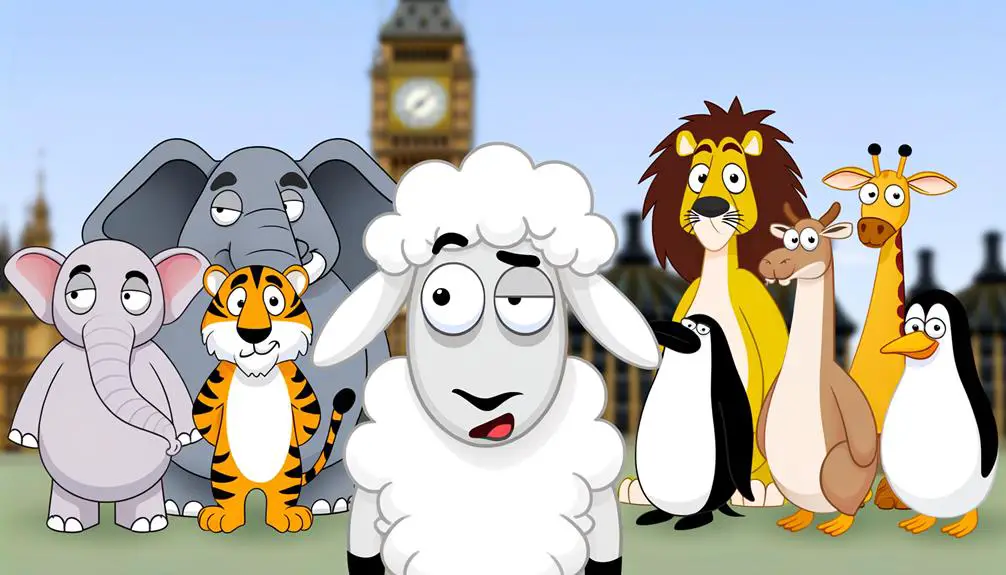In British slang, 'bugger' is a versatile term with origins tracing back to medieval prejudices. It's morphed from a label of heresy to a multifaceted expression that captures the dynamic nature of language. Depending on the context and tone, you might use it to show frustration, surprise, or even affection. Expressions like 'bugger all' signal nothingness, while 'bugger off' is a vital dismissal. Regional dialects and social settings greatly influence its perceived tone and meaning. Understanding these nuances is essential for its appropriate use. Mastering the subtleties of 'bugger' can enrich your linguistic skills and social interactions, shedding light on its cultural richness.
Key Takeaways
- "Bugger" in British slang can express surprise, annoyance, or affection, depending on the context.
- It has evolved from a derogatory term to a multifaceted expression used in various emotional contexts.
- Common variations include "bugger all" for nothing, "old bugger" for an affectionate tease, and "bugger off" as a dismissive command.
- The term's acceptability varies by region and audience, reflecting diverse social and cultural sensibilities.
- Mastery of "bugger" usage requires understanding its nuanced meanings and appropriate contexts in British slang.
The Origins of 'Bugger'

Tracing back to the Middle Ages, 'bugger' originates from the Latin word 'Bulgarus', meaning Bulgarian, reflecting a time when religious heresy was often associated with Eastern European regions. This term's metamorphosis into British slang weaves a complex tapestry through the threads of historical linguistics and ecclesiastical influence, underscoring how language mirrors societal attitudes and prejudices.
In the labyrinth of historical linguistics, 'bugger' is a prime example of how words evolve over centuries, both in form and function. Initially used by the Catholic Church to condemn the Bogomils of Bulgaria for their supposed heretical beliefs, the term's journey from a specific ethnic and religious label to a pejorative slang term in English showcases the potent blend of ecclesiastical influence and social dynamics. The church's authoritative stance on what constituted orthodoxy versus heresy played a pivotal role in casting the Bulgarians—and by extension, the term 'Bulgarus'—in a negative light.
This linguistic metamorphosis wasn't merely semantic; it was deeply entrenched in the socio-religious fabric of the time. As 'bugger' crossed linguistic and geographical boundaries, it shed some of its original specificity, gaining broader, more derogatory connotations. This shift highlights the ecclesiastical influence on language, illustrating how power dynamics and social attitudes can profoundly shape the evolution of words.
Defining 'Bugger' Today
In today's lexicon, 'bugger' has evolved into a multifaceted term, embodying both colloquial charm and the potential for offense, depending on its context and the speaker's intent. This linguistic evolution is significant, illustrating the dynamic nature of language as it adapts to changing social norms and cultural influences. The global spread of English has further complicated the picture, introducing 'bugger' to a wider audience, each bringing its own interpretations and sensibilities to the term.
| Aspect | Description |
|---|---|
| Linguistic Evolution | Originally pejorative, 'bugger' has softened in some contexts to express frustration or affection in a lighthearted manner. |
| Global Spread | As English has proliferated globally, 'bugger' has been adopted and adapted by various cultures, sometimes losing its original connotations. |
| Current Usage | Today, its meaning varies widely, from an expletive to an endearing term, reflecting the speaker's intent and the contextual nuances. |
Understanding 'bugger' today requires an appreciation of its rich history and the subtleties of modern usage. It's a prime example of how words can shift in meaning, influenced by cultural exchange and the fluid nature of language itself.
Common Uses in Conversation

Building on the understanding of 'bugger's' evolutionary journey, let's explore its common uses in conversation, where you'll find it serves various functions from expressing surprise to showing camaraderie. You'll discover that 'bugger' seamlessly integrates into daily discourse, embodying emotions and nuances that might otherwise require a plethora of words. This linguistic chameleon can denote frustration, empathy, or even affection, depending on context and intonation.
Navigating bugger etiquette, however, demands a nuanced understanding of its versatility and the social dynamics at play. In informal settings among friends, its usage can strengthen bonds, injecting a playful or empathetic note into the conversation. Yet, in more formal or unfamiliar company, its deployment might be frowned upon, signaling a need for discretion and awareness of the audience's sensibilities.
Moreover, while 'bugger' is relatively benign in British circles, it can lead to international misunderstanding. Travelers and speakers in global contexts must tread carefully, as words that are innocuous or even endearing in one culture can carry negative or offensive connotations in another. Grasping both the breadth of 'bugger's' application and the subtleties of cross-cultural communication is essential for anyone looking to master the art of British slang without inadvertently stepping on linguistic landmines.
Variations and Related Phrases
Diving into the linguistic landscape, you'll find that 'bugger' has spawned a variety of phrases and variations, each adding its own flavor to the rich tapestry of British slang. This linguistic evolution reflects not just the adaptability of language, but also its global spread, as these phrases carry the essence of British culture to other English-speaking regions.
| Variation | Context | Implication |
|---|---|---|
| Bugger all | General use | Nothing at all |
| Old bugger | Affectionate or pejorative | Old person or friend |
| Bugger off | Dismissive | Go away |
Each variation serves a distinct purpose, from expressing frustration or affection to commanding someone to leave. The term 'bugger all' signifies a complete lack of something, illustrating the versatility of 'bugger' in expressing the concept of nothingness. Conversely, 'old bugger' can swing between an affectionate term for a friend or a mild insult, depending on the tone and context of the conversation. Additionally, 'bugger off' is a direct command, brusquely telling someone to go away. This analysis reveals the depth and breadth of 'bugger' within the linguistic evolution of British slang, showcasing its adaptability and global spread.
Emotional Expressions and 'Bugger'

You'll find that the term 'Bugger' has evolved considerably from its origins, serving now as a versatile tool in conveying a spectrum of emotions, from annoyance to affection. Its application in emotional contexts highlights the linguistic elasticity of British slang, allowing speakers to modulate their message through tone and context. The variations in its use and the levels of politeness it can communicate are pivotal in understanding its role in expressive language.
Origins of 'Bugger' Usage
Tracing the origins of 'bugger' reveals its multifaceted role in expressing a wide range of emotions, from frustration to affection, within British slang. The term's historical etymology is deeply rooted in medieval Europe, deriving from the Latin 'Bulgarus', indicating a Bulgarian, reflecting the era's prejudices and misconceptions. Legal implications of its use have evolved considerably, once denoting a serious accusation of sodomy, to becoming a more light-hearted expletive expressed in moments of dismay or surprise.
| Aspect | Insight |
|---|---|
| Historical Root | Latin 'Bulgarus', a reference to Bulgarians. |
| Emotional Range | From frustration to affection. |
| Legal Evolution | From a serious crime to a casual expletive. |
This evolution underscores the dynamic nature of language and its ability to reflect societal shifts over time.
'Bugger' in Emotional Contexts
Building on the historical and legal evolution of 'bugger', it's important to explore how this term operates within various emotional contexts to fully grasp its nuanced role in British slang. The word 'bugger' is multifaceted, embodying frustration, affection, surprise, or even camaraderie, depending on the speaker's tone and the situation. Bugger etiquette plays a significant role in understanding these emotional nuances. For instance, it's often used among friends to express mild annoyance or sympathy, showcasing its versatility in conveying a range of feelings. The cultural implications of 'bugger' emphasize its embeddedness in British social interactions, illustrating how historical taboos can evolve into expressions of personal connection and emotional complexity. This evolution reflects the dynamic nature of language and culture, where words adapt to capture the human experience.
Variations and Politeness Levels
Delving into the variations and politeness levels of the term 'bugger' reveals its complex role in emotional expressions within British slang. Bugger etiquette is nuanced, hinging on context and the social dynamics at play. It's a term that straddles the line between offense and endearment, its acceptability largely dependent on the relationship between the speaker and listener. Social acceptability varies; in some circles, it's a benign expletive, while in others, it retains its potential to shock or offend. Understanding when and how to use 'bugger' requires a keen sense of social norms and the emotional landscape of the conversation at hand. It's this delicate balance that makes mastery of the term both a linguistic and social skill.
'Bugger' in British Media

You've observed 'bugger' as a multifaceted term within British slang, but its representation in media underscores its cultural resonance. The portrayal of 'bugger' in films and television has notably shaped its perception, marrying the word to moments of humor, frustration, or affection in the public's mind. Examining famous instances in cinema reveals not just the versatility of the expression, but also its enduring impact on British pop culture.
Media Portrayal Impact
The portrayal of 'bugger' in British media has greatly shaped public perception and understanding of this term, illustrating its evolution from a taboo to a more casually accepted piece of slang. Through its frequent appearance across various platforms, from television comedies to mainstream newspapers, 'bugger' has stirred censorship debates, challenging the boundaries of acceptable language. These discussions have not only influenced the regulatory landscape of British media but also contributed to a global understanding of the term. As it becomes integrated into popular culture, the word's original derogatory connotations have softened, evolving into a term that's often used in jest or exasperation. This shift reflects a broader societal change towards the acceptance of previously censored language, marking a significant impact on the vernacular landscape.
Famous Uses in Film
In British cinema, the term 'bugger' has found its way into numerous memorable scenes, embodying a blend of humor, frustration, and quintessentially British expressions of surprise.
- Censorship Debates: The use of 'bugger' in films has often sparked censorship debates, challenging the boundaries of acceptable language on screen. Its appearance raises questions about cultural sensitivity and the evolving nature of language in the public domain.
- Actor Improvisations: Some of the most iconic utterances of 'bugger' in British cinema are the result of actor improvisations. These spontaneous moments add a layer of authenticity and relatability, bridging the gap between character and audience.
- Cultural Reflection: The term's presence in films acts as a mirror to British society, reflecting attitudes towards vulgarity, humor, and the irreverent embrace of colloquial language.
Regional Differences Across the UK
Understanding how the term 'bugger' varies across the UK requires delving into regional dialects and local nuances that shape its use and interpretation. Dialect pronunciation plays a substantial role in how the word is perceived and understood in different parts of the country. In some regions, the pronunciation might soften the word, making it feel less harsh and more endearing, while in others, a sharper delivery can imbue the term with a stronger sense of disapproval or irritation.
Cultural acceptance of 'bugger' also varies greatly across the UK. In some areas, it's woven into the fabric of everyday language, used casually among friends and in less formal settings without causing offense. Here, 'bugger' can express a range of emotions from mild annoyance to affectionate teasing. Conversely, in regions with stricter social norms around language, its use might be less prevalent and generally reserved for moments of significant frustration or anger.
This regional diversity in the use and acceptance of 'bugger' highlights the complexity of British slang, where a single word can carry a multitude of meanings, influenced by local culture, history, and social attitudes. Understanding these regional differences is key to grasping the full spectrum of 'bugger's usage across the UK.
Controversies and Acceptance

While the term 'bugger' holds a place in the lexicon of British slang, its acceptance and the controversies surrounding it reveal a complex interplay of social norms and linguistic evolution. The journey of 'bugger' from a term with heavy legal implications to one more casually integrated into everyday language underscores the shifting landscape of what is deemed acceptable in public discourse.
- Legal Implications: Historically, 'bugger' was associated with criminal acts, deeply entwined with legal statutes that governed morality. Its shift away from a legal context into more common speech mirrors larger societal changes towards freedom of expression, albeit not without resistance from more conservative quarters.
- Societal Norms: The acceptability of 'bugger' varies widely across different segments of society. Among younger generations and in more liberal environments, its usage is often perceived as less offensive, a reflection of changing attitudes towards language that once carried significant stigma.
- Controversial Acceptance: Despite growing casual use, 'bugger' still sparks controversy, especially in formal settings or among those who remember its more derogatory origins. This tension highlights the ongoing negotiation between linguistic evolution and the preservation of societal norms, challenging speakers to navigate the complex terrain of modern British slang.
Learning to Use 'Bugger' Correctly
Mastering the correct usage of 'bugger' in British slang requires an acute awareness of its nuanced meanings and the contexts in which it's deemed appropriate. Grasping this not only elevates your linguistic finesse but guarantees you navigate social interactions with grace. With this in mind, let's explore how you can wield 'bugger' adeptly, blending etiquette tips with historical accuracy for a richer understanding.
| Context | Appropriate Usage |
|---|---|
| Frustration | 'Bugger! I've missed the bus again.' |
| Affectionate tease | 'You little bugger, you've eaten the last biscuit!' |
| Disbelief | 'Bugger me, that's unbelievable!' |
| Annoyance | 'That bugger never pays on time.' |
| Exasperation | 'I'm buggered after that long walk.' |







